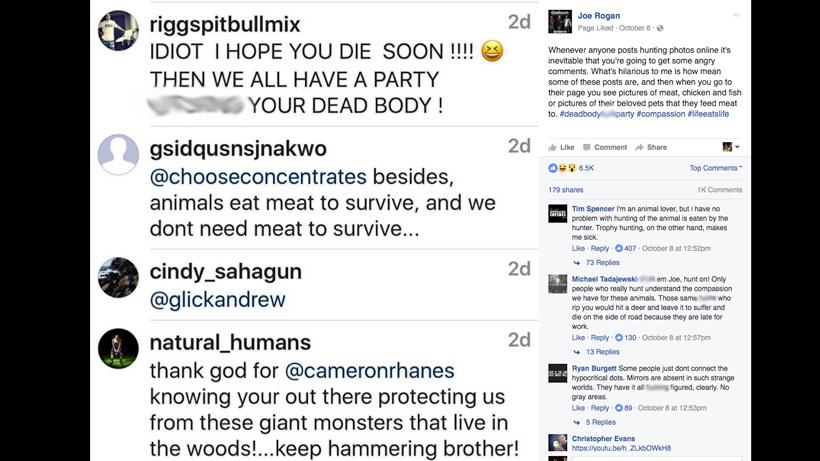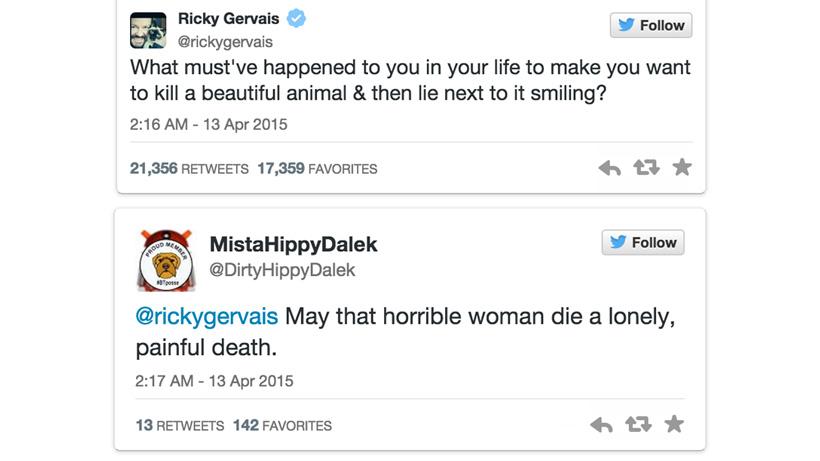




Image via Joe Rogan Facebook page.

Thanks to the power of celebrity status (and social media), Ricky Gervais turned all eyes toward a female hunter a few years ago.

We’ve all seen it before — especially this time of year — when social media feeds are filled with pictures commemorating successful hunts and full freezers. Usually, a fellow hunter posts a grip and grin picture of their trophy to a social media feed with the best of intentions. Then, in the blink of an eye, the insults, threats, and comments come flooding in from people unfamiliar to the original poster. Or you see a meme that has been reposted by someone in your social network portraying hunters as primal savages. On a rare occasion, these internet trolls gather enough muster to post a comment they’ve authored on the subject, which is commendable, but is often misguided and lacks reputable evidence backing their claim. These attacks not only detract from the successful hunter, but give the hunting community a black eye.
Unfortunately, no hunter is immune to this type of social media behavior. In these instances, the range of emotions can greatly vary. Depending on the situation and our mood, we may choose to engage in conversation that addresses the crude comments or we may ignore them to avoid fueling the fire. I have often wondered what the best response might be — even as I consider replying with an equally insulting comment that questions their existence. Yet, this type of behavior does nothing to address the problem. What it does, in the mind of the less informed anti-hunter, is confirm that the hunting community is an emotionally charged group of bloodthirsty individuals.
Many of us understand that hunting is more than harvesting an animal. We understand that it is a necessary role to ensure the continued existence of big game species. As hunters, we are first and foremost conservationists and outdoorsmen that make up the financial backbone of nearly all wildlife conservation programs. Through our application fees, tags, gear purchases, and donations we single-handedly ensure the future of big game and the tradition of hunting for younger generations. This is a charge and responsibility that we have willingly assumed and take a great deal of pride in. Unfortunately, these efforts often go unnoticed by many, including the anti-hunting community.
As with most hunting scenarios, during discussions of hunting practices, we need to maintain the higher ground in order to successfully debate challenges by the anti-hunting community. This not only benefits you as a person, but pays tribute to the efforts all hunters — both past and present. But how do we do that? How do we change the views and opinions of a group that wishes death upon the hunter, even to the point of threatening the lives of children who post their trophies to social media? The straightforward answer is we can’t. We will never change their views in a single social media post no matter how aggressive or fact filled the response is. We cannot expect that from someone who doesn’t understand our way of life. However, with a unified response, we can plant seeds of information rooted in fact that challenges their perception of the modern day hunter and sheds light on our cause.
Rather than falling into the trap of an emotionally charged argument founded on personal opinion or, even worse, failing to engage in discussion on the subject, we must take these opportunities to educate those who oppose our lifestyle with facts that convey truth. Although this is common knowledge among our inner circles, this is not the case with everyone. That means we must be the voice that provides the correct information for these individuals. The best way to do this is have a few facts on hand that you can cite quickly when needed.
In order to help in this endeavor, I have included a few power statistics to reference when responding to any social media challenge.
I encourage you to do your own research as well and become familiar with the bigger picture of conservation.
As hunters, we are proud of our accomplishments in the field and what our contributions have accomplished in the last century. As we all know, success isn’t always measured by harvesting an animal. Rather, it is based on the experiences we have both personally and with others. Unfortunately, those who have never hunted will never experience or understand this joy. As a hunting community, we need to keep sharing our photos, experiences, and harvests even though we are guaranteed to experience opposition. This should be done with the intent to help them see our side of the story, not convert them to the hunting lifestyle. Don’t stop posting pics or telling your story. In fact, do it more with the hopes of sharing the true facts of conservation and educating others about our efforts to protect wildlife.
Mark Twain has been quoted as saying, “Never argue with a fool, onlookers may not be able to tell the difference between the two.” In the case of hunting opposition and challenges to our way of life, we must understand it is an issue of misunderstanding. Although the attacks are often personal, try to consider each occurrence as an opportunity to educate. This is the single most important approach to changing the negative perception of the hunting community. Believe it or not, even with the barrage of negative comments, social media is an excellent platform for creating change.
If you have something that is guaranteed to bring light to our cause, please share it with the GOHUNT community in the comments section below.
Three out of four Americans approve of hunting, partly because hunters are America’s greatest positive force for conservation. [1]
In 1937, hunters proposed an 11% tax on guns, ammunition, bows, arrows, and other related items that was dedicated to conservation efforts. Since that time, this tax has generated $4.95 billion for conservation efforts across all 50 states. [1,2]
Hunting is the primary means of conservation and is considered the most effective means of ensuring herd health and the continuation of all species. [3]
Habitat restoration, research, and wildlife law enforcement work is almost entirely funded by fees paid by hunters. As a whole, hunters and special interest groups contribute a total of $1.6 billion annually to conservation efforts. Animal rights groups and anti-hunting supporters contribute less than 1% to this cause. No one, not even the federal government, gives more to conservation efforts than the hunting community. [1,2,3]
Through annual application license fees, hunters generate $796 million annually for conservation programs that impact all wild animal species. [2]
Over 600,000 jobs are sustained by the hunting community. This includes everyone from biologists and game wardens to the waitresses and cashiers in the small towns frequented by hunters during the season. [3]
Of the overall federal wildlife conservation budget, more than 60% or $185 million comes from hunting tags, licenses, taxes, and fees paid solely by the hunting community. The rest is supplemented from donations by special interests groups like the Rocky Mountain Elk Foundation and Mule Deer Foundation. [2,3]
Hunters purchase $38 billion per year in retail products ranging from groceries to sporting goods. [2,3]
Hunting is a management tool that curtails disease, ensures adequate habitat, balances populations with adequate resources, and limits crop damage all while generating revenue that impacts all wildlife for the greater good. [1]
Hunting is a healthy way to connect with nature and sustain a healthy lifestyle both physically and mentally. [1]
The efforts of hunters are the single greatest hope for the continued existence of wildlife and their habitat. As society loses ties with reality and our primitive connection with Mother Nature, the efforts of current and future hunters are necessary to ensure the continuation of conservation among the next generation. [1]
https://www.nssf.org/PDF/HunterFactCard.pdf
http://sportsmenslink.org/uploads/page/Economic_Impact_Report_E-version.pdf
http://www.nssf.org/PDF/research/HuntingInAmerica_EconomicForceForConservation.pdf